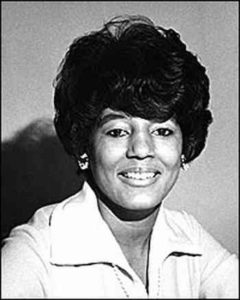
Vivian Malone
*Vivian Malone was born on this date in 1942. She was a research analyst and civil rights activist.
Vivian Juanita Malone Jones was born in Monroe County, Alabama, near Mobile, the fourth of eight children. Her parents worked at Brookley Air Force Base; her father served in maintenance, and her mother worked as a domestic servant. Her parents emphasized the importance of education and ensured that their children attended college. Each of Malone's older brothers attended Tuskegee University. Her parents were also active in the civil rights movement and often participated in local meetings, made donations, and engaged in community activities that promoted equality and desegregation.
As a teenager, young Malone was often involved in community organizations that aimed to end racial discrimination and worked closely with local leaders of the movement to advocate for school desegregation. Malone attended Central High School, where she was a member of the National Honor Society. In February 1961, she enrolled in Alabama Agricultural and Mechanical University, one of the state's few colleges for Black students. She attended Alabama A&M for two years and received a bachelor’s degree in Business Education. Malone had wanted to pursue a degree in accounting, a field of study not offered by Alabama A&M at the time. Moreover, the bachelor's degree Malone received was issued to her before the University had been fully accredited by the Southern Association of Colleges and Schools. To earn an accredited degree in accounting, Malone would have to transfer to another university.
In 1961, she had received word from a family friend that the local Non-Partisan Voter League had organized a plan to desegregate the University of Alabama's branch school in Mobile. Due to her exceptional performance in high school, Malone was one of several local Black students whom the organization recommended for admission to the Mobile campus. At least 200 Black students had applied, but their applications were rejected. The University denied admission to the applicants on the grounds of overenrollment and closed enrollment, the quotas already being filled, or the academic performance of the students not meeting required standards; however, it had become reasonably understood by the community that the University would not admit the Black students because of resistance to school desegregation.
On June 11, 1963, Malone and James Hood, accompanied by United States Deputy Attorney General Nicholas Katzenbach and a three-car motorcade full of federal marshals, arrived at the University of Alabama's campus to enroll. Governor George Wallace was flanked by a group of state troopers, waiting for them on campus and blocking the entryway to Foster Auditorium. Wallace intended to keep true to his promise of upholding segregation in the state and stopping "integration at the schoolhouse door."
As Malone and Hood waited in a car, Deputy Attorney General Katzenbach and a small team of federal marshals confronted Wallace, demanding that Malone and Hood be allowed entry by the state court order and for Wallace to step aside. Wallace had not only refused the order, but he interrupted Katzenbach; in front of the crowds of media crews surrounding him, Wallace delivered a short, symbolic speech concerning state sovereignty, claiming that "The unwelcomed, unwanted, unwarranted and force-induced intrusion upon the campus of the University of Alabama ... of the might of the Central Government offers frightful example of the oppression of the rights, privileges and sovereignty of this State by officers of the Federal Government."
After seeing that Wallace would not step aside, Katzenbach called upon the assistance of Robert Kennedy to force Wallace to permit the black students' entry into the University. Katzenbach took Malone to her dormitory and told her to see her room and eat lunch alone in the dining room if she became hungry. Malone went downstairs into the dining room and was surprised to be joined by several white students who ate lunch with her. She remained in the dormitory until the situation was determined to have calmed down. Despite earning high academic achievements from the University, she received no job offers in Alabama. She later joined the Civil Rights Division of the U.S. Department of Justice and served as a research analyst. While in Washington, she attended George Washington University and pursued a master’s degree in Public Administration.
She took a job as an employee relations specialist at the central office of the United States Department of Veterans Affairs. She was appointed Executive Director of the Voter Education Project and worked towards voter equality for minorities, thereby assisting millions of African Americans to register to vote. She later became the Director of Civil Rights and Urban Affairs and Director of Environmental Justice for the U.S. Environmental Protection Agency, a position she held until her retirement in 1996. In October 1996, Jones was chosen by the George Wallace Family Foundation to be the first recipient of its Lurleen B. Wallace Award of Courage. In 2000, the University of Alabama gave her a Doctor of Humane Letters. Vivian Malone Jones died following a stroke at age 63 on October 13, 2005, in an Atlanta hospital. Her funeral services were held at the Martin Luther King Jr. International Chapel at Morehouse College. Jones was a faithful member of From the Heart Church Ministries of Atlanta, where she served as an usher.
She was married to Dr. Mack Arthur Jones, a physician who died in 2004. She is survived by a son, a daughter, three grandchildren, four sisters, and three brothers. She was a faithful member of From the Heart Christian Ministries of Atlanta, where she served as an usher. Her brother-in-law is Eric Holder. Her nephew, Jeff Malone, was an All-American basketball student-athlete at Mississippi State University and a member of the NBA.